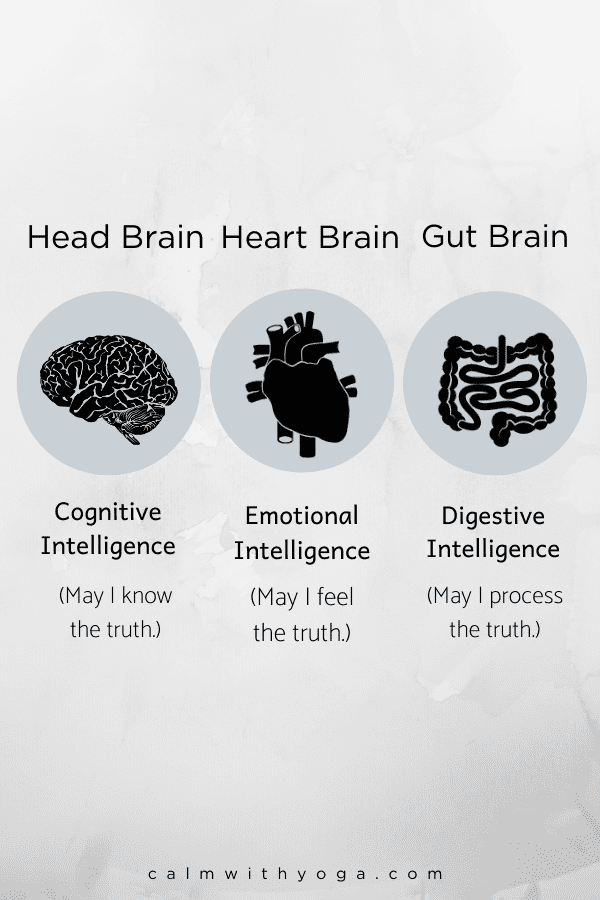What if I told you that your predominant emotional state and the way you breathe are deeply impacting your ability to think clearly and make better decisions, would that get your attention?
Well, it turns out that our emotions are more powerful than we give them credit – they have the power to influence:
- how we perceive our world
- how well we perform at our jobs and businesses
- how well we can relate to others
- how creative and intuitive we are
- how well we solve problems
- how well our bodies function
Coherence Defined:
Coherence, in any system, from the human body to social affairs, refers to a logical, orderly and harmonious connectedness between parts of a system or between people.
When we speak of heart-rhythm coherence or physiological coherence, we are referring to a specific assessment of the heart’s rhythms that appears as smooth, ordered and sine-wavelike patterns…
From a physics perspective, when we are in a coherent state, virtually no energy is wasted because our systems are performing optimally and there is synchronization between heart rhythms, the respiratory system, blood-pressure rhythms, etc.
Among the many benefits of personal coherence are increased composure, more energy, clear thinking, enhanced immune-system function, and hormonal balance.
– The Heartmath Institute, www.heartmath.org
Psycho – Physiological Coherence – Coherence of the Self:
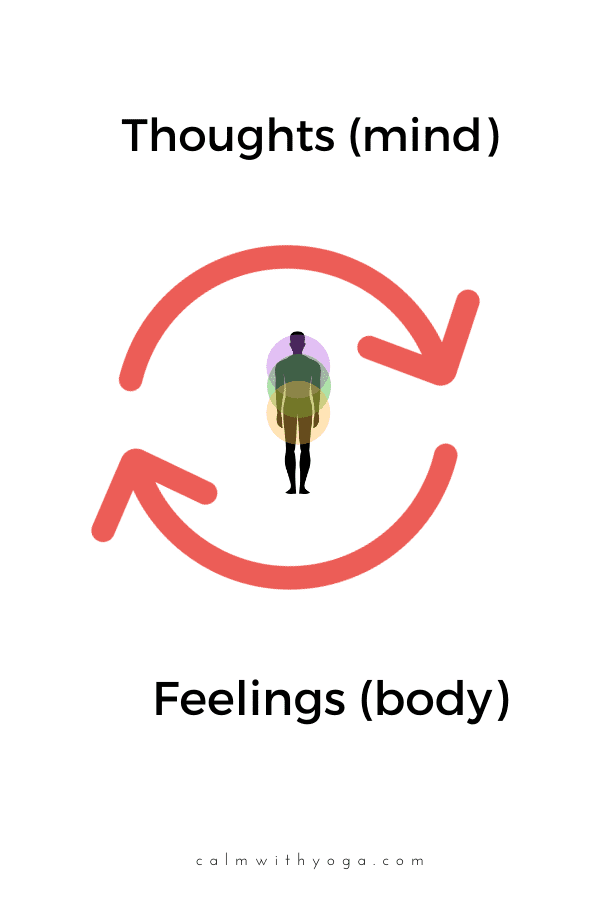
Psycho-physiological coherence refers to personal coherence.
It’s defined as the relationship between your body (via your feelings/emotions) and your mind (via your thoughts, beliefs, and expectations.)
Our thinking dictates the way we feel.
Our feelings and emotions physically impact the body and its various systems.
This creates a loop that continues on – we begin to think the way we feel, and then feel the way we think creating what’s commonly known as the ‘Thinking – Feeling Loop.’
Put simply, we think anxious thoughts, and then feel anxiety in our body, causing us to create more anxious thoughts, which then escalates our anxiety even further out of control.
Personal Coherence is increased when connectivity within your body systems is increased.
Specifically, when connectivity between your 3 Brains is increased so that they’re working in unison as a whole. (Yoga)
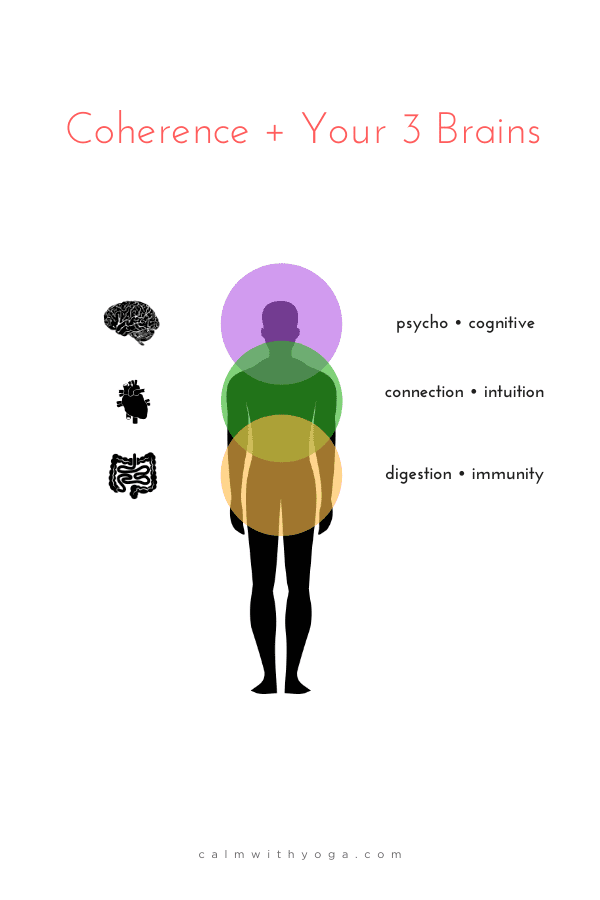
You have not one but THREE brains – did you know that?
- Head brain
- Heart brain
- Gut brain
Entering a coherent state is like switching the gears inside your mind, heart, and gut.
This awakens your cognitive, emotional, and digestive intelligence, which transforms not only anxiety, overwhelm, and dread almost instantly.
A coherent state also has the power to accelerate healing, boost and strengthen immunity, and re-balance chaotic hormones.
“When we create psychophysical coherence within ourselves…
We become more sensitive to the information within ourselves.
Specifically, we empower ourselves to create deep states of intuition on-demand, at will, when we choose.”
– Gregg Braden, “Resilience from the Heart”
What Gregg means by ‘become more sensitive to the information within ourselves’ is that we’ll be able to FEEL our inner world from a higher plane and we’ll pick up things that we missed before when in an incoherent, anxious state.
When we’re anxious our perception and experience are narrowed and skewed.
Our nervous system is so revved in defense and protection mode that we don’t see things as they are.
We misread our environment, we misread situations, and we misread people and their intentions.
Our reality becomes distorted.
Our actions, or shall I say, reactions are erratic and can even be extreme and volatile.
When we’re stressed, overwhelmed, or anxious the brain centers involved in thinking, reasoning, and decision-making literally become hijacked by the emotional brain centers, and we run the risk of making choices we’ll later regret.
So how do we become more coherent?
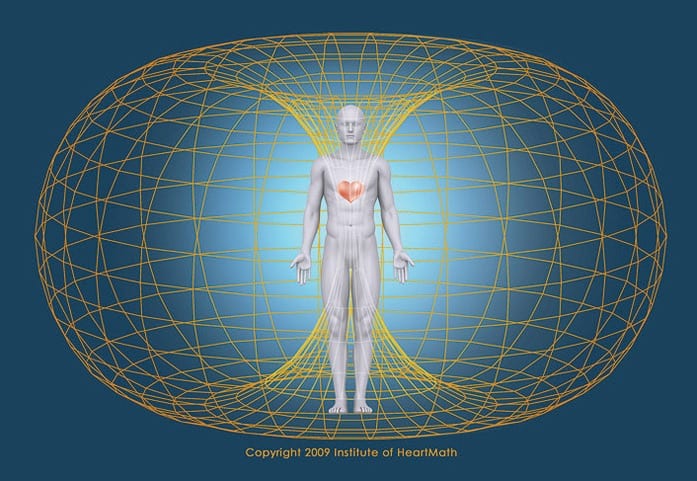
To put it simply – by activating our heart’s coherence.
According to research by the Heartmath Institute, you heart radiates an energetic field sixty times greater than your brain: (1)
The heart is the most powerful source of electromagnetic energy in the human body, producing the largest rhythmic electromagnetic field of any of the body’s organs.
The heart’s electrical field is about 60 times greater in amplitude than the electrical activity generated by the brain.
This means that your heart is the biggest power source of your body and it pulls your other brains and systems into its field.
The heart is the director of how coherent and harmonious your body is.
The heart impacts your body function and how well your brain is functioning:
“The heart’s magnetic field, which is the strongest rhythmic field produced by the human body, not only envelops every cell of the body, but also extends out in all directions into the space around us.
The heart’s magnetic field can be measured several feet away from the body by sensitive magnetometers.
Research conducted at HMI suggests the heart’s field is an important carrier of information.”
And what’s a measure of coherence?
How do you know you’re coherent?
How can you measure or tell?
According to Heartmath you can track and measure your personal coherence level by looking at your heart-rhythm and your heart-rate variability (aka HRV, the space in between each heartbeat.)
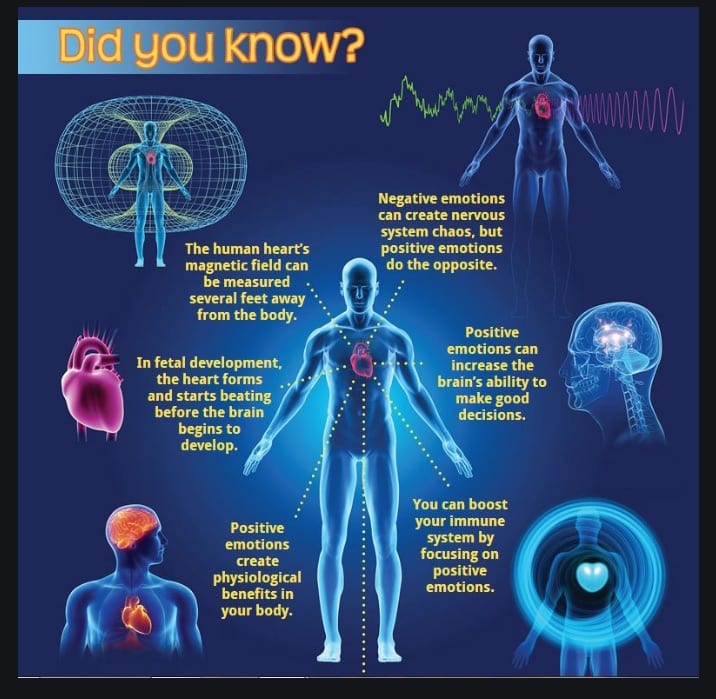
The higher your HRV the more space in between heartbeats.
Higher HRV = BUENO
Lower HRV = NO BUENO
The medical world has long known that a higher HRV is a marker of health, resilience, and well-being.
A lower HRV is the result of unmanaged stress and overwhelm, disease, etc.
So what lowers or increases HRV?
The image below is courtesy of Heartmath research.
It illustrates the impact different emotional states have on your HRV and therefore on your personal coherence:
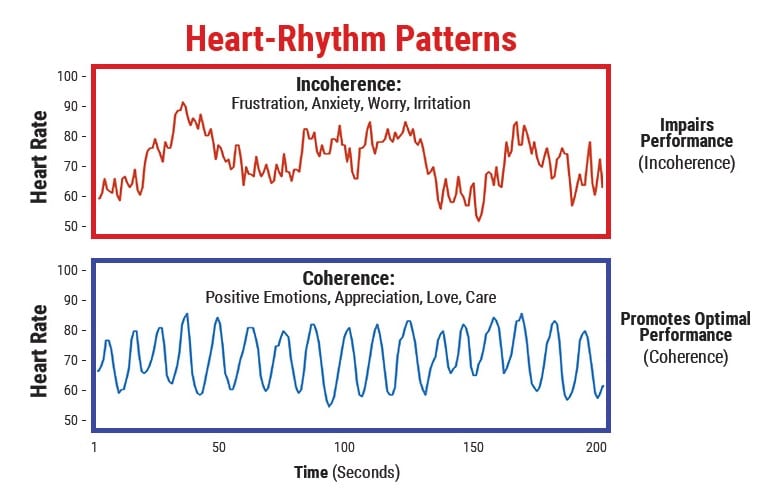
Thoughts and emotions can change heart-rhythm patterns, and these changing heart rhythms can affect other bodily systems as well, including the brain and its ability to process information, decision-making, problem-solving and creativity.
Heart rhythms also can directly affect how you feel, and how you feel can affect your heart rhythms.
A significant finding in this area of research is that we can intentionally experience positive feelings such as care, compassion, courage, and love to advantageously affect our heart rhythms and overall well-being.
– The Heartmath Institute
So to put it simply:
Low-frequency emotions such as anger, frustration, sadness, annoyance lower our HRV and therefore our coherence.
High-frequency emotions such as gratitude, appreciation, inspiration, and serenity increase our HRV and therefore increase our coherence:
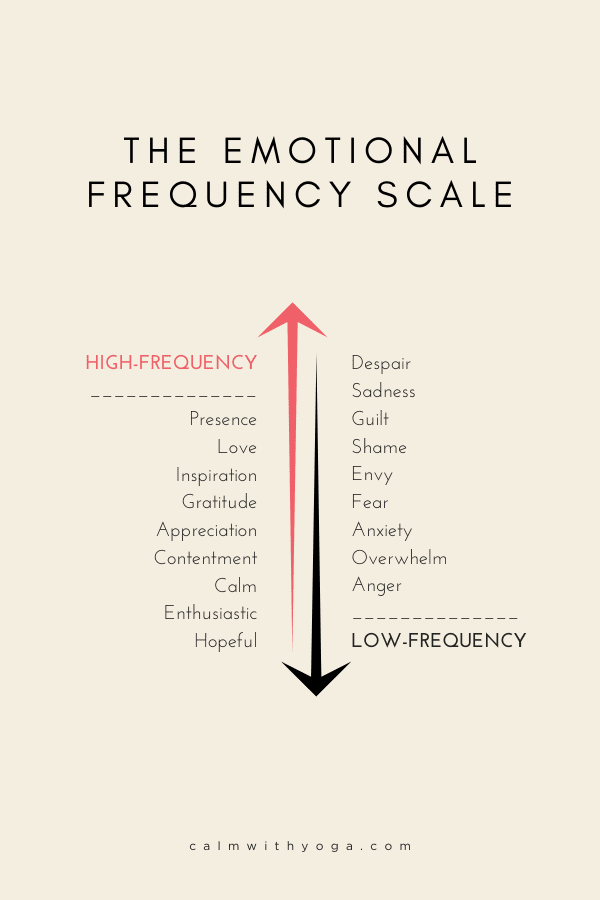
Follow these 3 steps DAILY to increase your coherence and boost your intelligence:
The following three things done on a regular basis will bring you coherence, harmony, confidence, mental power, higher intelligence, and all the good stuff!
Step #1 – Breathe slowly, deliberately, and mindfully.
One of the biggest things that can quickly get you into coherence is balanced breathing.
Within minutes your body receives safety signals that let it know it’s safe to stop defending and start regenerating.
You will do yourself a great favor by adopting a regular breathing practice, even if it’s just five minutes a day!
Follow the emblem below for a quick coherence building session…
Place your hands over your heart center and inhale for 5 counts, exhale for 5 counts…
Do it until you feel a shift. 🙂
Step #2 – Invoke the energy of gratitude, appreciation, and contentment.

This simple act literally shifts your heart’s rhythm according to Heartmath research.
You saw the change in heart rhythms, right?
Gratitude and appreciation definitely increase HRV!
Think of it like this:
When you have a heartfelt moment of genuine appreciation and gratitude you literally activate your heart’s intelligence.
This then activates your other two brains (head and gut) and create harmony and union (yoga) within every system in your body – hormonal systems, neural systems, nervous systems, etc.
This is the sweet spot!
Step #3 – Meditate daily.

It doesn’t matter what kind of meditation style you take up – what counts is that you commit to a daily practice and make it a part of your life.
You can try mindfulness meditation.
Here’s a breathing meditation if you feel you can’t meditate.
Meditation raises HRV but only if you practice regularly so give it a try.
Resources:
(1) https://www.heartmath.org/research/science-of-the-heart/energetic-communication/



